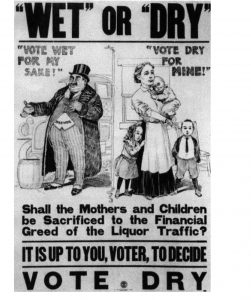By Joanne L. Yeck
Correspondent
This month marks the 100th anniversary of the enforcement of the Volstead Act, which prohibited the production and sale of alcohol across the United States. Long before the nation went dry, Buckingham County led the way, outlawing the sale of liquor within its borders.
On April 11, 1903, Maysville District, which included Buckingham’s courthouse and the town of Maysville, held a vote to decide whether or not liquor would be sold there after the current licenses held by the saloon-keepers expired. Richmond’s The Times-Dispatch covered the story, saying: “The whiskey men say they will make a fight if the temperance people do.” The newspaper punctuated the notice, commenting: “More clear money has been made in the [whiskey] business here than most any other, and they are loath to give it up.” Three days later, the newspaper reported the outcome of the vote: “One hundred and seventy votes were cast, and the drys won by a vote of two to one.”
Meanwhile, in Marshall District, which included Arvonia and New Canton, friction between the wets and the drys mounted and, following Maysville’s decision, Richmond’s Times-Dispatch announced the coming conflict:
ARVONIA, VA. April 20 – A fierce war is raging in Arvonia between the drys and the wets. The former, under the direction of Mr. A. L. Pitts, are busy with their petition seeking the signatures of the voters of Marshall District to enable them to fight for the cause of temperance, while the latter, under the leadership of Messrs. L. B. Lesueur, White and Trent, saloon-keepers in this section, are busy canvassing in opposition to the drys’ petition.
In Marshall District, wets won by a majority of just one vote. Judge Moss, who apparently anticipated considerable celebrating in Arvonia, appointed Mr. Lesueur a “special policeman” over his own barroom.
The contest did not end there. In July, Marshall District faced another vote to determine whether or not licenses to sell liquor would be renewed and the “drys” began a big push to convince the public that temperance was the way of the future. On June 5, The Times-Dispatch reported:
There are two flourishing bars in the district, one in this town (Arvonia) and the other in New Canton, three miles north of here. . . . Most of the businessmen and quarry operators of this town are active in behalf of prohibition on the grounds that the bars are detrimental to their business interests. So far, the issue is in doubt, both sides claiming that they will win. If the district goes dry there will remain only one wet district in Buckingham county and that one has only one small saloon.
Slate River District was the holdout.
In mid-June of 1903, a series of anti-liquor programs was launched in Marshal District by Professor S. C. Mitchell, the president of Virginia’s Anti-Saloon League, who delivered “a fine address to an enthusiastic audience” in Arvonia’s Williams’ Hall. Mitchell was introduced by Rev. Plummer Jones of Arvon Presbyterian Church.
On July 3, 1903, The Times-Dispatch noted that “Mr. J. W. West, field secretary of the Anti-Saloon League of Virginia, has been in the [Marshall] district a week, speaking in churches, halls and on roadsides to large audiences of people, and has so enthused the temperance element that they claim certain victory on July 11th, when the election takes place.”
West’s last speech at Mt. Zion Baptist Church, near New Canton, was attended by a large audience and he was followed by Rev. James E. Cook, of Richmond, who preached each night for a week at Arvon Presbyterian Church.
The women of Buckingham County did not yet have the power of the vote, however, they were not without influence. The Times-Dispatch noted:
On election day the young ladies of Arvonia, belonging principally to the Presbyterian and Baptist churches, will go to New Canton, the voting precinct, in a body, floating a banner and wearing streamer anti-saloon badges. They have secured a house and ground on the principal street in New Canton, and will there serve refreshments, such as ice cream, fruits, coffee, etc. to the friends of the temperance movement. It is understood that the ladies at Gold Hill, the other voting precinct, will proceed along similar lines.
The day following the election, The Times-Dispatch ran the Buckingham County news on its front page:
WHISKEY WINS IN BUCKINGHAM
The Wets Carry Marshall District by Three Majority.
A Great Surprise.
Buckingham County citizens may have been shocked and, on July 17, the newspaper updated the story, printing: “The whiskey men carried the election in New Canton District (sic), but the election is being contested on the grounds that some voted who had not right to do so.” Four days later, The Times-Dispatch expanded on the story:
. . . The election, instead of allaying, only intensified the excitement in the district, and especially in the towns of Arvon and New Canton. The fight against liquor is the sole topic of conversation upon the streets, the highways and the farms, and it is certain that on August 10th, when the case comes before the County Court, there will be present one of the largest crowds that ever went from this section of the county.
Both sides have employed able counsel and both sides are strengthening their lines.
The drys claim that there were many illegal votes cast for the wets, and that there was much irregularity and the fact that all of the judges at the New Canton Precinct were “wet” men seems to strengthen their cause.
The church people and the leading business people – such as the quarry operators, merchants and physicians – are will nigh unanimously working for local option. On election day the town of Arvon cast only 6 or 8 wet votes, the quarry people being almost unanimous against the sale of liquor here. The negro vote was cast, with a few sporadic exceptions, in favor of liquor.
Last week, when the question of contest was being agitated, the excitement became intense and Saturday at New Canton two or three dangerous rows were narrowly averted. At present the result of the fight cannot be seen, but the advocates of local option insist that the fight will never be given up until every bar in the county is closed.
The immediate outcome of this hearing is unknown, however, before 1909, Marshall and Slate River districts dried up and Virginia was completely dry by November 1, 1916⸻long before the national Prohibition went into effect on January 17, 1920.
In Buckingham County, it would be a long fight among the whiskey men, outlaws, scofflaws, and the revenuers until 1933, when national prohibition was repealed.




